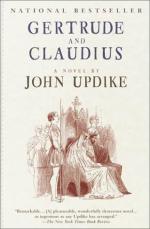|
This section contains 387 words (approx. 1 page at 400 words per page) |

|
Much spirited conversation might center on the audacity of Updike's narrative. How do readers feel about the contemporary author's appropriation of one of literature's most cherished texts, and his re-casting the roles of villain and heroine? Is this heresy of a sort? Do modern authors breach some kind of literary decorum by amending stories by great authors of the past? Or is Updike doing what Shakespeare did, adding his culture's vision and variety to a story that has become nearly archetypal?
Do such models as James Joyce's Ulysses, John Gardner's Grendel, or Jean Rhys's The Wide Sargasso Sea, which re-tell traditional narratives from a new perspective, apply to Updike's telling this classic story? Here are other questions upon which groups might focus.
1. Are Gertrude's transformations, from spirited girl to Horwendil's wife, to Fengon's mistress, to his wife and the grieving widow, fully motivated?
2. Does Updike overstate...
|
This section contains 387 words (approx. 1 page at 400 words per page) |

|




